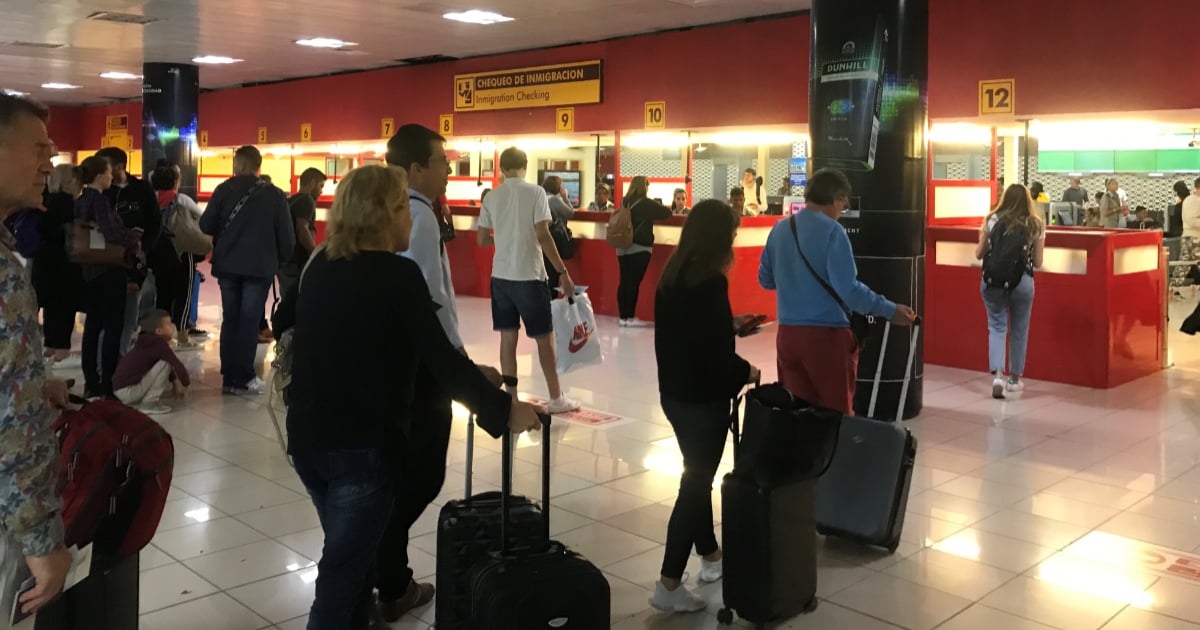The National Assembly of People's Power of Cuba has released legislative drafts on Immigration and Foreign Affairs, potentially eliminating the 24-month overseas stay limit and the designation of "migrant" for this reason. The government claims the objective of unveiling these legislative projects is to "promote citizen participation and contribute to the legal culture" of Cubans.
The legislative body has included the texts of both projects on its official website, alongside email addresses through which interested parties can express their opinions and suggestions.
Migration Law Project
This legislative project aims to regulate the migration process during one of the most significant crises Cuba faces in this area. The regime asserts that it has been crafted with a systemic development approach to achieve a regular, orderly, and safe flow of migration.
The document states that the government's intention is to "offer migration solutions that aid in the integration of Cubans into the new economic model." It specifies that Cubans within the national territory will be treated similarly to resident Cubans, except in aspects where the law dictates otherwise.
A notable change is the elimination of the 24-month overseas stay limit and the designation of "migrant" due to this reason, based on the new definition of effective migratory residence and other critical aspects.
The text defines "effective migratory residence" as the condition attained by Cuban citizens and foreign residents when they spend most of their time in the national territory each calendar year or through a combination of a stay period and other material evidence demonstrating their ties to the country.
The regime has been extending the 24-month overseas stay limit since the onset of the coronavirus pandemic, when thousands of Cuban migrants were unable to return to the island. Recently, the government has also announced other migration changes regarding the validity periods of Cuban passports.
Cubans will maintain the migration categories of Resident in the National Territory or Resident Abroad.
The migration law project introduces significant changes for Cubans residing abroad. Among the highlighted measures are provisions to facilitate temporary returns to Cuba, allowing extended stays without losing their foreign migration status. It also simplifies repatriation procedures for those wishing to return permanently, removing some bureaucratic requirements and speeding up administrative processes.
Additionally, the rights of residence for Cubans who have lived abroad for extended periods are recognized and expanded, granting access to health services, education, and labor rights similar to permanent residents. The project also promotes the recognition of academic and professional titles obtained abroad, facilitating the labor reintegration of returning Cubans.
Furthermore, Cubans residing abroad are included in social and investment programs, enabling them to participate in economic and social development initiatives in Cuba. Measures are also reinforced to protect the rights of Cubans abroad, ensuring consular assistance and support in vulnerable situations.
The project stipulates that Cubans can retain property ownership in Cuba even if they stay abroad for more than 24 months, provided they comply with established regulations. This means that property ownership is not automatically lost due to prolonged overseas stays, as long as the properties are properly registered and administrative requirements are met.
This Migration Law project was consulted with members of the Council of Ministers and other state entities in March 2024. It received dozens of observations, but the Parliament claims that "no discrepancies remain." The current version is approved for presentation to the ANPP.
"The project comprises XIV Titles, 21 Chapters, 18 Sections, 170 articles, 5 Transitional Provisions, 3 Special Provisions, and 4 Final Provisions. It proposes repealing Law 1312 Migration Law of September 20, 1976, and Decree-Laws 303/12 and 327/2015," the text notes.
Foreign Affairs Law Project
The project aims to regulate the care, protection, identification, and legal documentation of foreigners visiting or residing in Cuba. It will also govern the social integration process of residents, in accordance with the Constitution of the Republic of Cuba and international legal instruments on foreign affairs.
The National Assembly has also published legislative projects on Transparency and Access to Public Information, Administrative Procedure, and the System of Honorary Titles and Decorations of the Republic of Cuba.
(Developing Story)
Key Changes in Cuban Migration Laws
The recent legislative drafts from the Cuban government bring several significant changes to migration laws. Below are some frequently asked questions and their answers regarding these changes.
What is the new definition of effective migratory residence?
Effective migratory residence is the condition attained by Cuban citizens and foreign residents who spend most of their time in the national territory each calendar year or demonstrate their ties to the country through a combination of stay periods and other material evidence.
What changes are being made to the 24-month overseas stay limit?
The legislative draft proposes eliminating the 24-month overseas stay limit and the designation of "migrant" due to this reason.
How will the new laws affect Cubans residing abroad?
Cubans residing abroad will benefit from simplified repatriation procedures, extended stay allowances without losing their foreign migration status, and access to services and rights similar to permanent residents.
What are the implications for property ownership in Cuba for those living abroad?
Cubans can retain ownership of their properties in Cuba even if they stay abroad for more than 24 months, as long as they comply with the established regulations and administrative requirements.
